劳动合同法,中英文
劳动合同法英文版
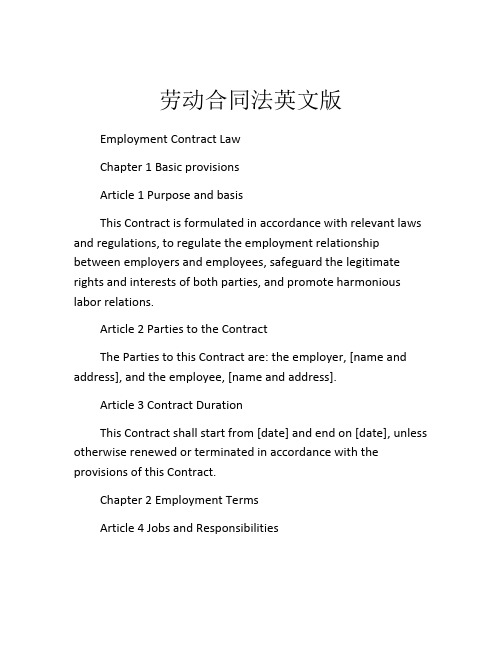
劳动合同法英文版Employment Contract LawChapter 1 Basic provisionsArticle 1 Purpose and basisThis Contract is formulated in accordance with relevant laws and regulations, to regulate the employment relationship between employers and employees, safeguard the legitimate rights and interests of both parties, and promote harmonious labor relations.Article 2 Parties to the ContractThe Parties to this Contract are: the employer, [name and address], and the employee, [name and address].Article 3 Contract DurationThis Contract shall start from [date] and end on [date], unless otherwise renewed or terminated in accordance with the provisions of this Contract.Chapter 2 Employment TermsArticle 4 Jobs and ResponsibilitiesThe Employer hereby agrees to employ the Employee in the position of [job title] with the following responsibilities: [duties and responsibilities].Article 5 Full-time or Part-time EmploymentThe Employee is employed on a [full-time/part-time] basis, and the work hours shall be [hours per day or week].Article 6 Salary, Bonus and BenefitsThe Employer shall pay the Employee a monthly salary of [amount], and may provide the Employee withperformance-related bonuses and other benefits as agreed between the Parties.Article 7 Work LocationThe Employee shall work at [address], unless otherwise agreed between the Parties.Chapter 3 Employee Rights and ObligationsArticle 8 Employee RightsThe Employee has the following rights:(a) the right to fair and just treatment;(b) the right to occupational safety and health;(c) the right to training and professional development;(d) the right to rest and leave in accordance with the law;(e) the right to join a trade union or to bargain collectively;(f) the right to receive remuneration in accordance with relevant regulations.Article 9 Employee ObligationsThe Employee shall:(a) observe the rules and regulations of the Employer;(b) perform work duties honestly and diligently;(c) be responsible for the work completed;(d) protect the trade secrets of the Employer;(e) maintain the safety of the workplace and equipment;(f) undertake training and professional development as required.Chapter 4 Termination of the ContractArticle 10 Contract RenewalIf the Employer intends to renew the Contract, it shall notify the Employee in writing at least [number] days before the expiry date of the Contract.Article 11 Termination by AgreementThe Parties may terminate the Contract by mutual consent, upon written agreement between them.Article 12 Termination by the EmployerThe Employer may terminate the Contract under the following circumstances:(a) the Employee is found to have falsified qualifications;(b) the Employee has severely violated company rules and regulations;(c) the Employee has breached the provisions of this Contract;(d) the Employee is found to be performing poorly in his/her job duties;(e) the Employee is unable to continue his/her work duties due to sickness or other incapacity.Article 13 Termination by the EmployeeThe Employee may terminate the Contract upon written notice to the Employer, under the following circumstances:(a) the Employer fails to provide the agreed salary, benefits or working conditions;(b) the Employee is subjected to harassment or discrimination;(c) the Employee has to leave due to serious family reasons;(d) the Employer has breached the provisions of this Contract.Chapter 5 Liability for BreachArticle 14 Compensation for BreachIf either Party to this Contract breaches the terms of this Contract, he/she shall be liable for damages caused to the other Party, and shall compensate the other Party for the damages suffered.Chapter 6 Miscellaneous ProvisionsArticle 15 Applicable LawThis Contract shall be governed by the laws and regulations of the People's Republic of China.Article 16 Dispute ResolutionAny dispute arising from the execution of this Contract may be resolved through consultation between the Parties. If consultation fails, the dispute may be submitted to an arbitration commission for arbitration, in accordance with the relevant laws and regulations.Article 17 Supplementary ProvisionsAny supplement, amendment, or cancellation of this Contract shall be made in writing and signed by both Parties.Article 18 Effectiveness and EnforceabilityThis Contract shall become effective after being signed by both Parties. This Contract shall be enforceable in accordance with the law.Article 19 DuplicationThis Contract shall be made in two copies, with each Party retaining one copy.Article 20 InterpretationThis Contract shall be interpreted in accordance with its spirit and purpose. In case of any ambiguity in the provisions, the Parties shall resolve the issue through consultation.。
劳动法中英文对照版

劳动法中英文对照版劳动法中英文对照版劳动合同法(中英文对照版)中华人民共和国劳劳合同法Labor Contract Law of thePeople' s Republic of…适用本法。
国家机劳、事业单位、社会团体和与其建立劳劳劳系的劳劳…劳动合同法中英文对照版劳动合同法中英文对照版Order of the President of thePeople' s Republic of China 中华人民共和国主席令(第六十五号)第六十五号)(No. 65) The Labor ...中华人民共和国劳动合同法(2008年版)(中英文对照版)中华人民共和国劳动合同法(2008年版)(中英文对照版)-中华人民共和国劳动合同法主席令第六十五号《中华人民共和Labour Contract Law of the People...《中华人民共和国劳动法》中英文对照《中华人民共和国劳动法》中英文对照-Labor Law of thePeople's Republic of China The Labor Law of the People's Rep...劳动合同法(中英文版)确劳动合同双方权益,构建和发Article 2 ThisLaw shall apply to the ...的劳动者,订立依照本法执行。
Article 3 The principle of lawfuhess,・・・埃塞俄比亚《劳动法》中英对照埃塞俄比亚《劳动法》中英对照-OF THE FEDERAL DEMOCRATIC REPUBLIC OF ETHIOPIA 埃塞俄比亚联邦民主共和国12th Year NO. 30 ADD...中英文对照劳动合同法中英文对照劳动合同法-2008新劳动合同法英文版全文(LAW OF THE PEOPLE'S REPUBLIC OF CHINA ON EMPLOYMENT CON...劳动合同中英对照劳动合同中英对照-劳动合同年月日甲方(用人单位):名称: 法定代表人:乙方(员工):姓名:性别:出生年月:身份证号码:户籍所在地:联系方式:...2013年杂志订阅目录中英文对照版)《台声》《中国劳动法规与社会保障大全》月刊半月刊周刊半月刊月刊年刊720元/年132元/年2250元/年2040元/年120元/年…2013报刊杂志目录中英文对照版)《台声》《中国劳动法规与社会保障大全》旬刊月刊半月刊周刊半月刊月刊年刊540元/年720元/年132元/年2250元/年2040元…资料库1资料库2资料库3资料库4资料库5。
劳动合同法中英文对照版
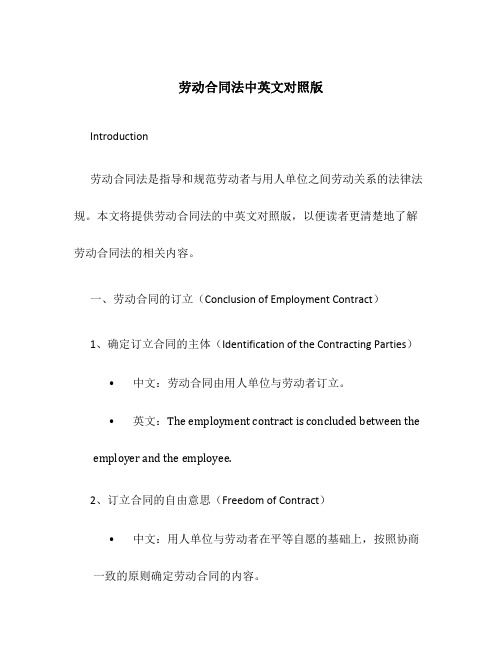
劳动合同法中英文对照版Introduction劳动合同法是指导和规范劳动者与用人单位之间劳动关系的法律法规。
本文将提供劳动合同法的中英文对照版,以便读者更清楚地了解劳动合同法的相关内容。
一、劳动合同的订立(Conclusion of Employment Contract)1、确定订立合同的主体(Identification of the Contracting Parties)•中文:劳动合同由用人单位与劳动者订立。
•英文:The employment contract is concluded between the employer and the employee.2、订立合同的自由意思(Freedom of Contract)•中文:用人单位与劳动者在平等自愿的基础上,按照协商一致的原则确定劳动合同的内容。
•英文:The employer and the employee shall enter into the employment contract on the basis of equality and voluntariness, and shall determine the content of the employment contract through consultation and agreement.3、订立合同的形式(Form of the Contract)•中文:劳动合同应当采用书面形式订立。
•英文:The employment contract shall be concluded in written form.二、劳动合同的期限(Term of Employment Contract)1、有固定期限的劳动合同(Fixed-term Employment Contract)•中文:有固定期限的劳动合同,是指用人单位与劳动者约定在一定期限内工作的合同。
•英文:The fixed-term employment contract refers to the contract in which the employer and the employee agree to work fora certn period of time.2、无固定期限的劳动合同(Non-fixed-term Employment Contract)•中文:无固定期限的劳动合同,是指用人单位与劳动者未约定期限的合同。
劳动法中英文对照版

劳动法中英文对照版劳动法中英文对照版劳动合同法(中英文对照版)中华人民共和国劳劳合同法Labor Contract Law of the People’s Republic of ...适用本法。
国家机劳、事业单位、社会团体和与其建立劳劳劳系的劳劳...劳动合同法中英文对照版劳动合同法中英文对照版Order of the President of the People’s Republic of China 中华人民共和国主席令(第六十五号) 第六十五号) (No. 65) The Labor ...中华人民共和国劳动合同法(2008年版)(中英文对照版)中华人民共和国劳动合同法(2008年版)(中英文对照版) - 中华人民共和国劳动合同法主席令第六十五号《中华人民共和Labour Contract Law of the People...《中华人民共和国劳动法》中英文对照《中华人民共和国劳动法》中英文对照- Labor Law of the People's Republic of China The Labor Law of the People's Rep...劳动合同法(中英文版)确劳动合同双方权益,构建和发Article 2 This Law shall apply to the ...的劳动者,订立依照本法执行。
Article 3 The principle of lawfulness, ...埃塞俄比亚《劳动法》中英对照埃塞俄比亚《劳动法》中英对照- OF THE FEDERAL DEMOCRATIC REPUBLIC OF ETHIOPIA 埃塞俄比亚联邦民主共和国12th Year NO. 30 ADD...中英文对照劳动合同法中英文对照劳动合同法- 2008 新劳动合同法英文版全文( LAW OF THE PEOPLE'S REPUBLIC OF CHINA ON EMPLOYMENT CON...劳动合同中英对照劳动合同中英对照- 劳动合同年月日甲方(用人单位) : 名称: 法定代表人: 乙方(员工) : 姓名: 性别: 出生年月: 身份证号码: 户籍所在地: 联系方式: ...2013年杂志订阅目录中英文对照版) 《台声》《中国劳动法规与社会保障大全》月刊半月刊周刊半月刊月刊年刊720 元/年132 元/年2250 元/年2040 元/年120 元/年...2013报刊杂志目录中英文对照版) 《台声》《中国劳动法规与社会保障大全》旬刊月刊半月刊周刊半月刊月刊年刊540 元/年720 元/年132 元/年2250 元/年2040 元...资料库1 资料库2 资料库3 资料库4 资料库5欢迎您下载我们的文档,后面内容直接删除就行资料可以编辑修改使用资料可以编辑修改使用致力于合同简历、论文写作、PPT设计、计划书、策划案、学习课件、各类模板等方方面面,打造全网一站式需求。
中华人民共和国劳动合同法英语版
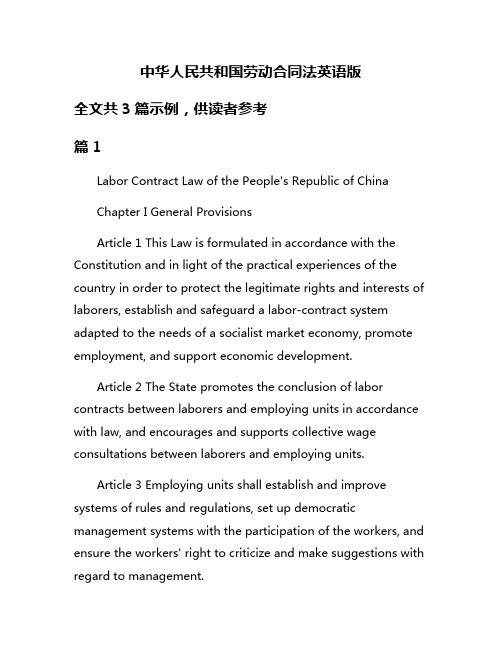
中华人民共和国劳动合同法英语版全文共3篇示例,供读者参考篇1Labor Contract Law of the People's Republic of ChinaChapter I General ProvisionsArticle 1 This Law is formulated in accordance with the Constitution and in light of the practical experiences of the country in order to protect the legitimate rights and interests of laborers, establish and safeguard a labor-contract system adapted to the needs of a socialist market economy, promote employment, and support economic development.Article 2 The State promotes the conclusion of labor contracts between laborers and employing units in accordance with law, and encourages and supports collective wage consultations between laborers and employing units.Article 3 Employing units shall establish and improve systems of rules and regulations, set up democratic management systems with the participation of the workers, and ensure the workers' right to criticize and make suggestions with regard to management.Article 4 In signing labor contracts, both parties shall abide by the principles of voluntariness, equality, fairness, and mutual benefit, and shall not harm the public interests, damage the lawful rights and interests of any other party or violate socialist ethics.Article 5 The conclusion, performance, amendment, and termination of labor contracts must comply with legal procedures, and neither party may, by seeking the protection of the law, undermine the legitimate rights and interests of the other party.Chapter II Conclusion of Labor ContractsArticle 6 The conclusion of labor contracts shall comply with the principle of equality, voluntariness, lawful conducts, negotiation, and reaching agreement through consultations.Article 7 An employing unit and the worker conclude a labor contract shall provide the following:1. name, domicile, and legal representative or main person in charge of the employing unit;2. the worker's name, domicile, and legal representative or main person in charge;3. contract period;4. job description and the place of work;5. working hours, rest and leave, working conditions;6. labor protection conditions, labor conditions and protection for special types of work;7. labor compensation;8. social insurance;9. labor discipline; and10. other matters stipulated by laws and regulations.Article 8 A labor contract shall be concluded in a written form, and in the absence of a written labor contract, the employing unit shall provide the worker with a written statement containing the matters specified in Article 7 of this Law.Article 9 An employment unit and the worker shall conclude a fixed-term labor contract if one of the following circumstances arises:1. for a fifteen-day fixed-term contract, work period not exceeding one hundred and eighty days or for a longer period but to reach a certain number of hours as agreed;2. for interim, supplementary, or duty-casual labor contracts.Article 10 Where labor contracts are concluded with any of the following workers, or where the parties agree to hire a labor dispatch entity, the employing unit and the worker shall conclude a written labor contract and determine the term of the contract to be at least three or more years, and such labor contract shall be concluded in accordance with the principles prescribed in this Law:1. the worker is under thirty years of age;2. the worker has obtained the professional qualification certificate for the post to be filled;3. the worker is equipped with special skills in short supply;4. the worker's training expenses shall be repaid within the term of the contract.Chapter III Performance of Labor ContractsArticle 11 An employing unit shall keep confidential the trade secrets of the company it is working for, as well as the worker's private information.Article 12 An employing unit may not unilaterally change the necessary terms of the labor contract, unless the employing unit applies for alteration to the labor contract and reaches an agreement with the worker.Article 13 If the employing unit has the need to dismiss the worker in accordance with Article 39 of this Law, it shall notify the worker in writing and explain the reason for the dismissal.Chapter IV Amendment and Termination of Labor ContractsArticle 14 In the event that an employing unit or a worker wishes to amend the terms of a labor contract, it shall do so through written negotiations, and after reaching an agreement, it shall sign an alteration to the labor contract.Article 15 The employing unit or worker shall both sides may amend the terms of a labor contract by mutual consent.Article 16 In the event that the employing unit terminates a labor contract in compliance with Article 40 of this Law, it shall serve a thirty-day notice and pay compensation to the worker in accordance with the law.Chapter V Special ProvisionsArticle 17 Labor dispatch entities shall use employment services provided by labor dispatch entities in accordance with law.Article 18 The employing unit shall, in accordance with the provisions of laws and regulations, enter into a written contract with the labor dispatch entity, contract the labor dispatch entity'ssealed certificate of the employer to hire or engage laborers in the name of the employer, and inform the laborer to enter into a written contract with the labor dispatch entity.Chapter VI Legal LiabilitiesArticle 19 In the event that either party to a labor contract breaches the contract, the other party may claim damages in accordance with the provisions of civil law.Article 20 In the event that an employing unit violates the provisions of this Law, causing damages to the worker, the worker may request the employing unit to cease any illegal act and compensate for the loss.Article 21 In the event that either party to a labor contract violates the provisions of this Law, causing damages to the other party, the other party may request the party at fault to cease the illegal act and pay compensation.Article 22 Labor administrative departments shall, in accordance with law, order the employing unit to correct its misconduct in the performance of its obligations, and impose a fine in accordance with law for violations of labor laws and regulations.Chapter VII Supplementary ProvisionsArticle 23 This Law shall not apply to the labor contract relationship between the state organs, institutions, social organizations and their staff, and shall be separately regulated.Article 24 Employing units and workers shall, in accordance with this Law, and wage regulations in state enterprises, sign collective wage contracts, and conclude substantive working relationships with workers.Article 25 This Law shall not apply to domestic workers hired by families for personal housework.Article 26 This Law applies both to relying on personal contract personnel in accordance with the law or state agencies, institutions, social organizations, and other organizations.Article 27 This Law shall enter into force on January 1, 2008.篇2Labor Contract Law of the People's Republic of ChinaChapter I General ProvisionsArticle 1 This Law is enacted in accordance with the Constitution and for the purposes of protecting the legitimate rights and interests of laborers, regulating labor relationships, ensuring social fairness and harmonious labors, fosteringharmonious and stable employment relationships, improving labor productivity, and promoting economic and social development.Article 2 This Law shall be applicable to the conclusion and performance of labor contracts between laborers and employing units within the territory of the People's Republic of China.Article 3 Labor contracts as mentioned in this Law include contracts under which laborers perform labor for employing units, receive remuneration, and are under the employing units' management, or contracts under which the parties concerned conclude agreements on the performance of such labor as well as other remuneration and working conditions.Article 4 Labor contracts shall be concluded according to the principles of fairness, equality, voluntariness, lawfulness, and consensus through consultation.Article 5 Laborers shall conclude labor contracts with employing units on the basis of equality, voluntariness, and negotiations. Laborers shall have the right to conclude a labor contract or have the right to refuse the conclusion of a labor contract.Chapter II Conclusion of Labor ContractsSection 1 Conclusion of Labor ContractsArticle 6 Labor contracts shall be concluded in written form. The employing unit shall, within 30 days from the day the laborer goes to work, conclude a written labor contract with the laborer.Article 7 The term of a labor contract may be fixed,open-ended, or for completion of a specific task. If the term is not expressly specified, the labor contract shall be deemed open-ended.Article 8 The labor contract shall specify the identities of the parties, working hours, rest and leave, work safety and occupational health, labor protection, social insurance, remuneration, labor dispute, etc.Section 2 exceptional Circumstances for Conclusion of Labor ContractsArticle 9 In any of the following circumstances, the employing unit may temporarily employ laborers on aterm-by-term basis without concluding written labor contracts:1. the term of the labor contract is no more than three months;2. the employing unit needs a substitute for laborers who are taking leaves;3. the employing unit needs to recruit workers other than its existing employees for temporary expansion of its business;4. other exceptional circumstances prescribed by laws and administrative regulations.Article 10 In any of the following circumstances, the employing unit shall not conclude a labor contract:1. a laborer is in his or her probationary period;2. a laborer has any of the conditions stipulated in Article 36;3. other circumstances where labor contracts shall not be concluded prescribed by laws and administrative regulations.Chapter III Performance of Labor ContractsSection 1 Labor RemunerationArticle 11 When determining the amount of remuneration, the minimum wage rates shall be observed.Article 12 The employing unit shall pay remuneration directly to the laborer in legal tender and shall pay the remuneration at least once a month.Article 13 The remuneration shall include the basic salary and overtime pay, bonuses, allowances, subsidies, etc. Theemploying unit shall pay all remuneration agreed upon in the labor contract.Section 2 Working Hours, Rest, and LeaveArticle 14 The employing unit shall observe the working hours system, implement the labor rest system, and organize laborers to rest on statutory holidays according to the law.Article 15 The employing unit may, upon consultation with the laborer, adjust the working hours and rest periods by such means as shift rotation.Article 16 The employing unit is required to ensure that laborers enjoy their statutory annual paid leave, maternity leave, marriage leave, and funeral leave in accordance with law.Chapter IV Labor Safety and HealthArticle 17 The employing unit shall implement the state labor standards for occupational disease prevention and control and for occupational health supervision, and shall provide laborers with labor safety and health conditions that meet the requirements for production safety.Article 18 The employing unit shall conduct regular health checks on laborers who are engaged in operations likely to causeoccupational diseases in accordance with state regulations, free of charge to the laborer.Article 19 The laborer has the right to report any actions of the employing unit violating laws, regulations, or the labor contract that are detrimental to labor safety and health to the relevant administrative departments.......篇3Labor Contract Law of the People's Republic of ChinaChapter I General ProvisionsArticle 1 This Law is formulated to improve the labor contract system, standardize labor contract signing and performance, balance the rights and obligations of parties to labor contracts, protect the legitimate rights and interests of employment, and promote economic and social development.Article 2 This Law shall apply to the conclusion, performance, amendment, rescission, termination, cancellation, and other activities related to labor contracts between employing units and workers within the territory of the People's Republic of China.Article 3 Employing units shall conclude a written labor contract with workers in accordance with the principle of equality, voluntariness, fairness, and honesty.Article 4 Labor contracts shall be concluded in accordance with the following principles:(1) Equal negotiation;(2) Voluntary participation;(3) Law-abiding, public-welfare compliance, and good faith.Article 5 Labor contracts shall include the following essential agreements:(1) The term of the labor contract;(2) The content of labor;(3) Labor remuneration;(4) Working hours, rest, leave, social insurance, labor protection, and working conditions;(5) Labor discipline;(6) Work safety and health.Chapter II Conclusion of Labor ContractsArticle 6 Employing units shall provide workers with labor contracts that comply with the requirements stipulated in this Law and enter into written labor contracts with workers within one month from the date of employment.Article 7 Workers may enter into a labor contract with two or more employers at the same time, provided that the aggregate working hours do not exceed the statutory limit.Article 8 The term of a labor contract shall be agreed upon through negotiation between employing units and workers but shall not exceed 5 years.Article 9 Employing units may conclude a fixed-term labor contract with workers under any of the following circumstances:(1) The term of the task is determined;(2) The replacement of workers who are temporarily unable to work;(3) The nature of the work requires fixed-term contract;(4) The employing unit meets the conditions prescribed in laws and regulations.Article 10 Employing units and workers may conclude an open-ended labor contract if any of the following occurs:(1) The worker has worked continuously for 10 years;(2) The employing unit adopts labor dispatch to the worker continuously twice;(3) Other situations stipulated in laws and regulations.Chapter III Performance of Labor ContractsArticle 11 If the employing unit and the worker fail to conclude a written labor contract within a month from the date of employment, a labor relationship is deemed to have been established.Article 12 Employing units shall provide workers with safe working conditions, pay wages, and provide labor protection and occupational health conditions in accordance with relevant laws and regulations.Article 13 Employing units shall not extend the working hours of workers beyond the statutory limit, except under special circumstances, and shall ensure that workers have rest and leave in accordance with relevant laws and regulations.Article 14 Employing units shall provide workers with social insurance in accordance with relevant laws and regulations.Article 15 Employing units shall pay wages to workers in accordance with the relevant regulations, ensure that wages are paid on time and in full, and may not deduct or delay wages without justified reasons.Chapter IV Amendment, Rescission, and Termination of Labor ContractsArticle 16 Employing units and workers may amend labor contracts through negotiation, and the content of the amendment shall be recorded in writing.Article 17 Employing units and workers may rescind labor contracts through negotiation, and the reasons for rescission shall be recorded in writing.Article 18 Labor contracts may be terminated under any of the following circumstances:(1) The term of the labor contract expires;(2) Both parties agree to terminate the labor contract through negotiation;(3) The employing unit dissolves, declares bankruptcy, or is revoked;(4) The worker is unfit for the original work due to illness or injury;(5) Other situations stipulated in laws and regulations.Chapter V Protection of Workers' Rights and InterestsArticle 19 Employing units shall not allow workers to work under the age of 16.Article 20 Employing units shall not discriminate against workers on the basis of ethnicity, race, gender, or religion.Article 21 Employing units shall provide equal pay for equal work to workers, regardless of their gender.Chapter VI Legal LiabilityArticle 22 Employing units that violate the provisions of this Law shall bear legal liability in accordance with the law.Article 23 Employing units shall compensate workers for losses suffered due to violation of this Law.Chapter VII Supplementary ProvisionsArticle 24 This Law shall come into force on January 1, 2008.Article 25 The actual operation and implementation of labor contracts shall be adjusted in accordance with the requirements of laws and regulations.Article 26 The State Council shall be responsible for the interpretation and implementation of this Law.Labor Contract Law of the People's Republic of China(Adopted at the 28th Meeting of the Standing Committee of the Tenth National People's Congress on June 29, 2007)(Effective as of January 1, 2008)。
劳动合同全文中英对照版

劳动合同全文中英对照版第一章:总则第一条本合同是甲方(用人单位)与乙方(劳动者)之间关于劳动权利和义务的协议。
English::This contract is an agreement between the Employer ( Party A ) and the Employee ( Party B ) concerning labor rights and obligations.第二条甲乙双方应当遵循平等、自愿、协商一致的原则,订立、变更、解除或者终止本合同。
English::Both parties shall follow the principles of equality, voluntariness, and consensus in the conclusion, modification, termination or termination of this contract.第二章:劳动合同的履行第三条甲方应按照本合同的约定,为乙方提供劳动条件,保障乙方的合法权益。
English::The Employer shall, in accordance with the terms of this contract, provide labor conditions for the Employee and protect the legitimate rights and interests of the Employee.第四条乙方应按照甲方的要求,认真履行岗位职责,完成工作任务。
English::第三章:劳动报酬第五条甲方向乙方支付的劳动报酬,按照本合同的约定和国家相关法律法规的规定执行。
English::The Employer shall pay the Employee's labor remuneration in accordance with the provisions of this contract and the relevant national laws and regulations.第六条乙方享有国家规定的带薪年休假、节假日休息等福利待遇。
中华人民共和国劳动合同法 英文版
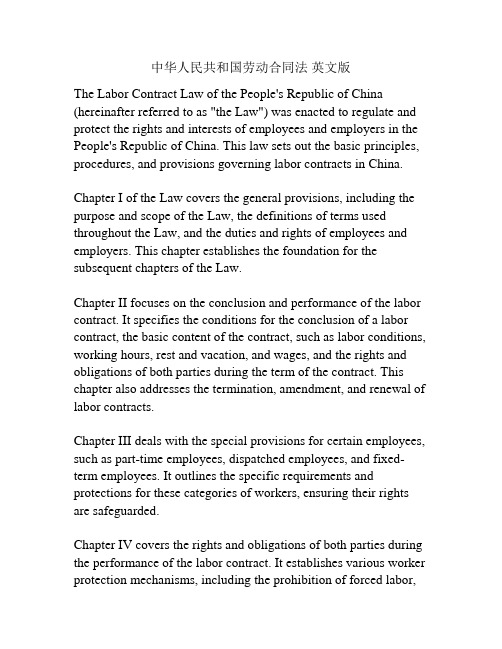
中华人民共和国劳动合同法英文版The Labor Contract Law of the People's Republic of China (hereinafter referred to as "the Law") was enacted to regulate and protect the rights and interests of employees and employers in the People's Republic of China. This law sets out the basic principles, procedures, and provisions governing labor contracts in China.Chapter I of the Law covers the general provisions, including the purpose and scope of the Law, the definitions of terms used throughout the Law, and the duties and rights of employees and employers. This chapter establishes the foundation for the subsequent chapters of the Law.Chapter II focuses on the conclusion and performance of the labor contract. It specifies the conditions for the conclusion of a labor contract, the basic content of the contract, such as labor conditions, working hours, rest and vacation, and wages, and the rights and obligations of both parties during the term of the contract. This chapter also addresses the termination, amendment, and renewal of labor contracts.Chapter III deals with the special provisions for certain employees, such as part-time employees, dispatched employees, and fixed-term employees. It outlines the specific requirements and protections for these categories of workers, ensuring their rights are safeguarded.Chapter IV covers the rights and obligations of both parties during the performance of the labor contract. It establishes various worker protection mechanisms, including the prohibition of forced labor,child labor, and gender discrimination. It also addresses matters such as training and skill enhancement, occupational safety and health, and social insurance.Chapter V establishes the collective agreements and collective contracts between the trade unions and employers. It stipulates the negotiation, conclusion, and implementation procedures for collective contracts, promoting harmonious labor relations and collective bargaining.Chapter VI deals with the supervision and inspection of labor contracts. It outlines the responsibilities of labor authorities in supervising the enforcement of labor contracts and handling disputes between employees and employers.Chapter VII establishes the legal liability and dispute resolution mechanisms. It stipulates the legal consequences that arise from the violation of labor contract obligations and provides employees with the right to claim compensation for damages. It also sets out the procedures for mediation, arbitration, and litigation to resolve labor disputes.Chapter VIII includes supplementary provisions, such as the application of the Law to labor contracts formed outside of China, the relationship with other laws, regulations, and provisions, and the implementation date of the Law.In conclusion, the Labor Contract Law of the People's Republic of China plays a crucial role in protecting the labor rights and interests of employees and employers. It sets out detailedprovisions on the conclusion, performance, termination, and dispute resolution of labor contracts, creating a fair and balanced legal framework for labor relations in China.。
中华人民共和国劳动合同法英语版
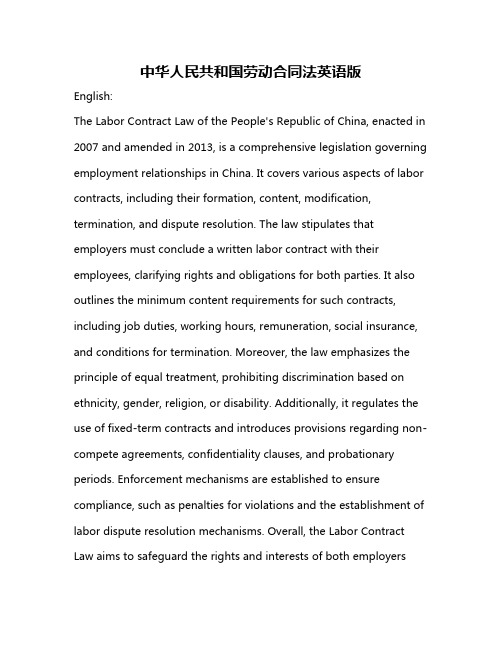
中华人民共和国劳动合同法英语版English:The Labor Contract Law of the People's Republic of China, enacted in 2007 and amended in 2013, is a comprehensive legislation governing employment relationships in China. It covers various aspects of labor contracts, including their formation, content, modification, termination, and dispute resolution. The law stipulates that employers must conclude a written labor contract with their employees, clarifying rights and obligations for both parties. It also outlines the minimum content requirements for such contracts, including job duties, working hours, remuneration, social insurance, and conditions for termination. Moreover, the law emphasizes the principle of equal treatment, prohibiting discrimination based on ethnicity, gender, religion, or disability. Additionally, it regulates the use of fixed-term contracts and introduces provisions regarding non-compete agreements, confidentiality clauses, and probationary periods. Enforcement mechanisms are established to ensure compliance, such as penalties for violations and the establishment of labor dispute resolution mechanisms. Overall, the Labor Contract Law aims to safeguard the rights and interests of both employersand employees, promote harmonious labor relations, and contribute to the stable development of the Chinese labor market.中文翻译:《中华人民共和国劳动合同法》于2007年颁布,并在2013年进行修订,是一部全面规范中国就业关系的立法。
- 1、下载文档前请自行甄别文档内容的完整性,平台不提供额外的编辑、内容补充、找答案等附加服务。
- 2、"仅部分预览"的文档,不可在线预览部分如存在完整性等问题,可反馈申请退款(可完整预览的文档不适用该条件!)。
- 3、如文档侵犯您的权益,请联系客服反馈,我们会尽快为您处理(人工客服工作时间:9:00-18:30)。
篇一:《中华人民共和国劳动合同法》中英文对照labor contract law of the peoples republic of chinaorder of the president of the peoples republic of china (no.65)president of the peoples republic of china hu jintaojune 29, 2007labor contract law of the peoples republic of chinacontentschapter i general provisionschapter ii formation of labor contractschapter iii fulfillment and change of labor contracts chapter iv dissolution and termination of labor contracts chapter v special provisions section 1 collective contract section 2 worker dispatch section 3 part-time employment chapter vi supervision and inspection chapter vii legal liabilities chapter viii supplementary provisionschapter i general provisionsarticle 1 this law is formulated for the purposes of improving the labor contractual system, clarifying the rights and obligations of both parties of labor contracts, protecting the legitimate rights and interests of employees, and establishing and developing a harmonious and stable employment relationship.article 2 this law shall apply to the establishment of employment relationship between employees andenterprises, individual economic organizations, private non-中华人民共和国劳动合同法中华人民共和国主席令(第六十五号)《中华人民共和国劳动合同法》已由中华人民共和国第十届全国人民代表大会常务委员会第二十八次会议于2007年6月29日通过,现予公布,自2008年1月1日起施行。
中华人民共和国主席 胡锦涛2007年6月29日中华人民共和国劳动合同法(2007年6月29日第十届全国人民代表大会常务委员会第二十八次会议通过)目 录第一章 总则第二章 劳动合同的订立第三章 劳动合同的履行和变更第四章 劳动合同的解除和终止第五章 特别规定第一节 集体合同第二节 劳务派遣第三节 非全日制用工第六章 监督检查第七章 法律责任第八章 附则第一章 总则第一条 【立法宗旨】为了完善劳动合同制度,明确劳动合同双方当事人的权利和义务,保护劳动者的合法权益,构建和发展和谐稳定的劳动关系,制定本法。
第二条 【适用范围】中华人民共和国境内的企业、个体经济组织、民办非企业单位等组织(以下称用人单位)与劳动者建立劳动关系,订立、履行、变enterprise entities, or other organizations (hereafter referred to as employers), and to the formation, fulfillment, change, dissolution, or termination of labor contracts.the state organs, public institutions, social organizations, and their employees among them there is an employment relationship shall observe this law in the formation, fulfillment, change, dissolution, or termination of their labor contracts.article 3 the principle of lawfulness, fairness, equality, free will, negotiation for agreement and good faith shall be observed in the formation of a labor contract.a labor contract concluded according to the law shall have a binding force. the employer and the employee shall perform the obligations as stipulated in the labor contract.article 4 an employer shall establish a sound system of employment rules so as to ensure that its employees enjoy the labor rights and perform the employment obligations.where an employer formulates, amends or decides rules or important events concerning the remuneration, working time, break, vacation, work safety and sanitation, insurance and welfare, training of employees, labor discipline, or management of production quota, which are directly related to the interests of the employees, such rules or important events shall be discussed at the meeting of employees representatives or the general meeting of all employees, and the employershall also put forward proposals and opinions to the employees and negotiate with the labor union or the employees representatives on a equal basis to reach agreements on these rules or events.during the process of execution of a rule or decision about an important event, if the labor union or the employees deems it improper, they may require the employer to amend or improve it through negotiations.article 5 the labor administrative department of the peoples government at the county level or above shall, together with the labor union and the representatives of the enterprise, establish a sound three-party mechanism to更、解除或者终止劳动合同,适用本法。
国家机关、事业单位、社会团体和与其建立劳动关系的劳动者,订立、履行、变更、解除或者终止劳动合同,依照本法执行。
第三条 【基本原则】订立劳动合同,应当遵循合法、公平、平等自愿、协商一致、诚实信用的原则。
依法订立的劳动合同具有约束力,用人单位与劳动者应当履行劳动合同约定的义务。
第四条 【规章制度】用人单位应当依法建立和完善劳动规章制度,保障劳动者享有劳动权利、履行劳动义务。
用人单位在制定、修改或者决定有关劳动报酬、工作时间、休息休假、劳动安全卫生、保险福利、职工培训、劳动纪律以及劳动定额管理等直接涉及劳动者切身利益的规章制度或者重大事项时,应当经职工代表大会或者全体职工讨论,提出方案和意见,与工会或者职工代表平等协商确定。
在规章制度和重大事项决定实施过程中,工会或者职工认为不适当的,有权向用人单位提出,通过协商予以修改完善。
用人单位应当将直接涉及劳动者切身利益的规章制度和重大事项决定公示,或者告知劳动者。
第五条 【协调劳动关系三方机制】县级以上人民政府劳动行政部门会同工会和企业方面代表,建立健全协调劳动关系三方机制,共同研究解决有关劳动关系的重大问题。
coordinate employment relationship and shall jointly seek to solve the major problems related to employment relations. article 6 the labor union shall assist and direct the employees when they conclude with the employers and fulfilllabor contracts and establish a collective negotiation mechanism with the employers so as to maintain the lawful rights and interests of the employees.第六条 【集体协商机制】工会应当帮助、指导劳动者与用人单位依法订立和履行劳动合同,并与用人单位建立集体协商机制,维护劳动者的合法权益。
